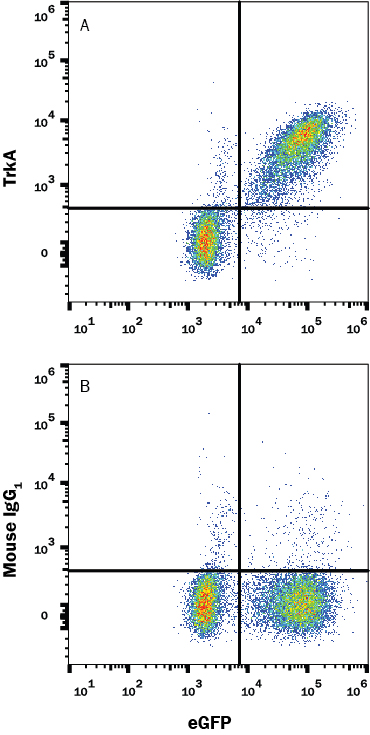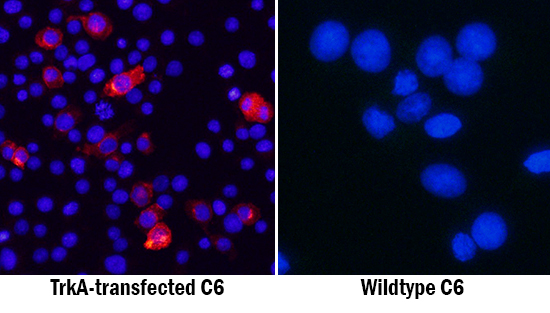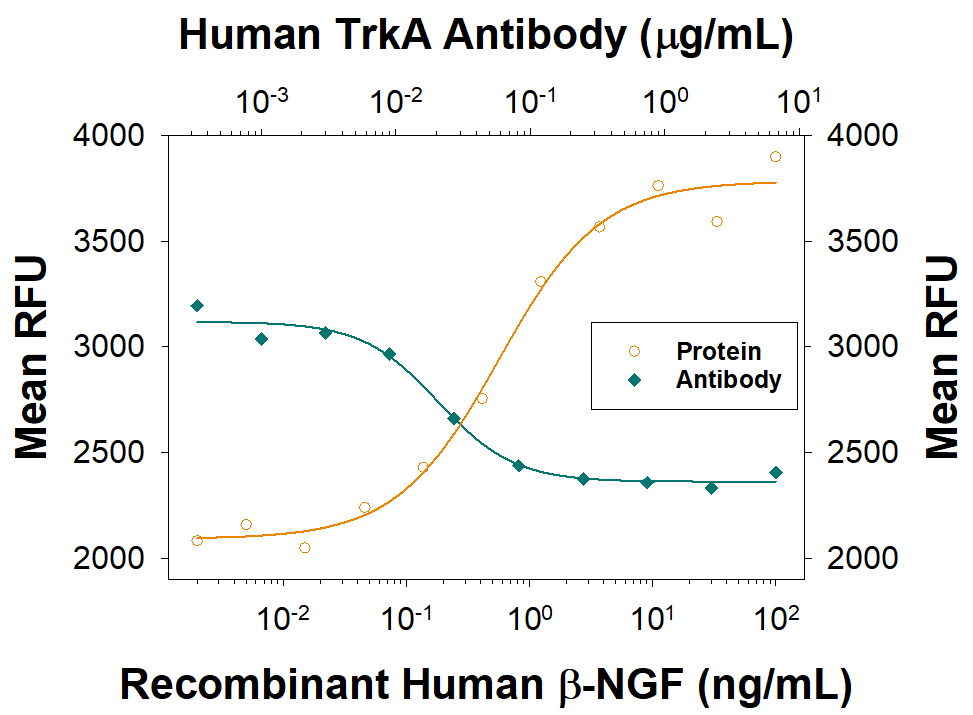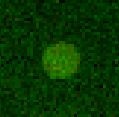Human TrkA Antibody Summary
Ala33-Glu407
Accession # P04629
Applications
Please Note: Optimal dilutions should be determined by each laboratory for each application. General Protocols are available in the Technical Information section on our website.
Scientific Data
 View Larger
View Larger
Detection of TrkA in HEK293 Human Cell Line Transfected with Human TrkA and eGFP by Flow Cytometry. HEK293 human embryonic kidney cell line transfected with human TrkA and eGFP was stained with (A) Mouse Anti-Human TrkA Monoclonal Antibody (Catalog # MAB1752) or (B) Mouse IgG1 isotype control antibody (Catalog # MAB002) followed by APC-conjugated Anti-Mouse IgG Secondary Antibody (Catalog # F0101B). View our protocol for Staining Membrane-associated Proteins.
 View Larger
View Larger
TrkA in C6 Rat Cell Line. TrkA was detected in immersion fixed C6 rat glioma cell line transfected with TrkA (positive stain) or wildtype (negative stain) using Mouse Anti-Human TrkA Monoclonal Antibody (Catalog # MAB1752) at 8 µg/mL for 3 hours at room temperature. Cells were stained using the NorthernLights™ 557-conjugated Anti-Mouse IgG Secondary Antibody (red; Catalog # NL007) and counterstained with DAPI (blue). Specific staining was localized to cytoplasm. View our protocol for Fluorescent ICC Staining of Cells on Coverslips.
 View Larger
View Larger
Cell Proliferation Induced by beta -NGF and Neutralization by Human TrkA Antibody. Recombinant Human beta -NGF (Catalog # 256-GF) stimulates proliferation in the TF-1 human erythroleukemic cell line in a dose-dependent manner (orange line) as measured by Resazurin (Catalog # AR002). Proliferation elicited by Recombinant Human beta -NGF (2 ng/mL) is neutralized (green line) by increasing concent-rations of Mouse Anti-Human TrkA Monoclonal Antibody (Catalog # MAB1752). The ND50 is typically 5-40 ng/mL.
Reconstitution Calculator
Preparation and Storage
- 12 months from date of receipt, -20 to -70 °C as supplied.
- 1 month, 2 to 8 °C under sterile conditions after reconstitution.
- 6 months, -20 to -70 °C under sterile conditions after reconstitution.
Background: TrkA
Trk A, the product of the proto-oncogene trk, is a member of the neurotrophic tyrosine kinase receptor family that has three members. Trk A, Trk B and Trk C preferentially bind NGF, NT-4 and BDNF, and NT-3, respectively. All Trk family proteins share a conserved complex subdomain organization consisting of a signal peptide, two cysteine-rich domains, a cluster of three leucine-rich motifs, and two immunoglobulin-like domains in the extracellular region, as well as an intracellular region that contains the tyrosine kinase domain. Two distinct Trk A isoforms that differ by virtue of a 6-amino acid insertion in their extracellular domain have been identified. The longer Trk A isoform is the only isoform expressed within neuronal tissues whereas the shorter Trk A is expressed mainly in non-neuronal tissues. NGF binds to Trk A with low affinity and activates its cytoplasmic kinase, initiating a signaling cascade that mediates neuronal survival and differentiation. Higher affinity binding of NGF requires the coexpression of Trk A with the p75 NGF receptor (NGFR), a member of the tumor necrosis factor receptor superfamily. NGFR binds all neurotrophins with low affinity and modulates Trk activity as well as alters the specificity of Trk receptors for their ligands. NGFR can also mediate cell death when expressed independent of Trk.
- Esposito, D. et al. (2001) J. Biol. Chem. 276:32687.
- Sofroniew, M.V. et al. (200) Annu. Rev. Neurosci. 24:1217.
Product Datasheets
FAQs
No product specific FAQs exist for this product, however you may
View all Antibody FAQsReviews for Human TrkA Antibody
Average Rating: 4 (Based on 1 Review)
Have you used Human TrkA Antibody?
Submit a review and receive an Amazon gift card.
$25/€18/£15/$25CAN/¥75 Yuan/¥2500 Yen for a review with an image
$10/€7/£6/$10 CAD/¥70 Yuan/¥1110 Yen for a review without an image
Filter by:




